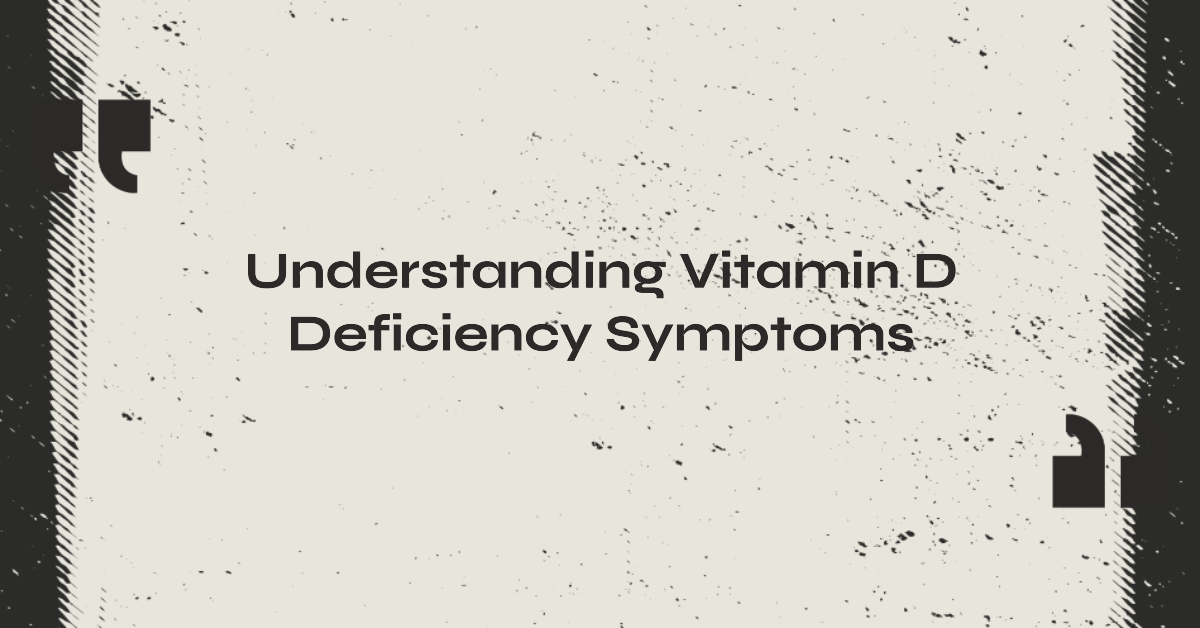In the journey towards maintaining optimal health, ensuring that our bodies receive an adequate supply of essential vitamins is crucial. One such vital nutrient is vitamin D. Also known as the “sunshine vitamin,” vitamin D plays a pivotal role in various bodily functions. However, many individuals across the globe suffer from vitamin D deficiency, which can lead to a range of health issues. In this article, we will delve into the intricate details of vitamin D deficiency symptoms, causes, and effective solutions.
Table of Contents
Vitamin D Deficiency Symptoms
When your body lacks sufficient vitamin D, it can manifest in various ways. Recognizing these symptoms can help you address the issue before it escalates. Some common symptoms include:
- Fatigue and Weakness: Feeling unusually tired or weak despite getting enough rest is a potential sign of vitamin D deficiency. This deficiency can impact muscle strength and overall energy levels.
- Bone Pain and Muscle Aches: Vitamin D is essential for maintaining healthy bones and muscles. Deficiency can lead to bone pain, muscle aches, and even conditions like osteoporosis.
- Mood Swings and Depression: Studies have linked low vitamin D levels with mood disorders such as depression and anxiety. Sunshine vitamin plays a role in regulating neurotransmitters that affect mood.
- Impaired Wound Healing: If you notice that your wounds are taking longer than usual to heal, it could be due to inadequate vitamin D levels. This vitamin is crucial for promoting the healing process.
- Hair Loss: Hair health can also be influenced by vitamin D deficiency. Experiencing excessive hair loss or thinning might indicate an underlying deficiency.
- Frequent Infections: Vitamin D is known to play a role in the immune system’s functioning. Those with low levels may be more prone to infections and illnesses.
- Bone Deformities in Children: In children, severe vitamin D deficiency can lead to rickets, a condition characterized by weakened and deformed bones.
- Difficulty Concentrating: Some individuals with vitamin D deficiency may experience difficulty concentrating or cognitive impairment.
- Muscle Tremors: Vitamin D is involved in nerve and muscle function. Tremors or muscle spasms could indicate a deficiency.
Causes of Vitamin D Deficiency
Understanding the root causes of vitamin D deficiency is essential for prevention and treatment. Several factors contribute to this issue:
- Limited Sun Exposure: Our bodies naturally produce vitamin D when exposed to sunlight. Insufficient sun exposure, especially in regions with limited sunlight, can lead to deficiency.
- Dietary Choices: Vitamin D is found in certain foods like fatty fish, egg yolks, and fortified dairy products. A diet lacking these foods can contribute to deficiency.
- Dark Skin Tone: Melanin in the skin reduces the body’s ability to produce vitamin D from sunlight. Individuals with darker skin tones may require more sun exposure to maintain adequate levels.
- Obesity: Vitamin D is fat-soluble, which means it can get trapped in fat tissues. Obesity can lead to lower bioavailability of vitamin D.
- Age and Aging: As we age, our skin’s ability to produce vitamin D diminishes. Older adults may require more supplementation.
- Certain Medical Conditions: Conditions such as Crohn’s disease, celiac disease, and kidney disorders can hinder the body’s absorption of vitamin D.
- Use of Sunscreen: While sunscreen is essential for protecting the skin from harmful UV rays, excessive use can block vitamin D synthesis.
- Geographic Location: People living in northern latitudes with limited sunlight for a significant portion of the year are more prone to deficiency.
Solutions and Prevention
Thankfully, addressing vitamin D deficiency is possible through various strategies:
- Sun Exposure: Spend some time outdoors during sunlight hours. Aim for around 15 minutes of sun exposure on arms and legs a few times a week.
- Dietary Changes: Incorporate vitamin D-rich foods into your diet, such as salmon, sardines, fortified cereals, and dairy products.
- Supplements: If you struggle to get enough vitamin D through sunlight and diet, supplements are a viable option. Consult a healthcare professional before starting any supplementation regimen.
- UV Lamps: In regions with limited sunlight, UV lamps can mimic the effects of natural sunlight, aiding in vitamin D synthesis.
- Monitor Levels: Regularly check your vitamin D levels through blood tests. This can help you track your progress and adjust your approach accordingly.
- Healthy Lifestyle: Maintaining a balanced diet, exercising regularly, and managing stress can all contribute to better overall health and vitamin D levels.
Conclusion
Vitamin D deficiency is a widespread concern that can lead to various health challenges. Recognizing the symptoms, understanding the causes, and implementing effective solutions are essential steps towards maintaining optimal health. By making informed choices about sun exposure, diet, and supplementation, you can ensure that your body receives the necessary vitamin D it needs to thrive.
FAQs
-
Can vitamin D deficiency affect my skin health?
Yes, vitamin D plays a role in skin health. Deficiency can lead to skin issues such as dryness and psoriasis.
-
Is it possible to get too much vitamin D?
Yes, excessive vitamin D intake can lead to toxicity. It’s important to follow recommended guidelines for supplementation.
-
Can I rely solely on sunlight for my vitamin D needs?
While sunlight is a natural source of vitamin D, factors like geographic location and skin tone can affect its effectiveness. A balanced approach is recommended.
-
Can infants be at risk of vitamin D deficiency?
Yes, infants who are exclusively breastfed may require vitamin D supplementation, as breast milk may not provide sufficient amounts.
-
What role does vitamin D play in immune function?
Vitamin D supports the immune system by helping immune cells function effectively and regulating immune responses.
-
Can vitamin D deficiency impact heart health?
Emerging research suggests a connection between vitamin D deficiency and heart health issues, but more studies are needed for a conclusive understanding.
Gaining a comprehensive understanding of vitamin D deficiency symptoms, their underlying causes, and the potential effects on our health is a crucial step towards proactive well-being. By arming ourselves with knowledge, we empower ourselves to make informed choices that contribute to our overall vitality. Remember, our health is an intricate puzzle, and every piece matters. To dive deeper into a wealth of similar insightful articles, designed to enhance your understanding of health and wellness, click here. Your journey to a healthier and more informed lifestyle continues with every article you explore.














Leave a Reply
View Comments